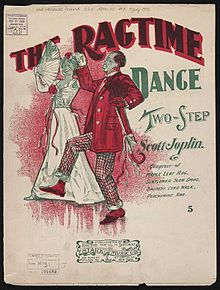The Ragtime Dance
| The Ragtime Dance | |
|---|---|
| by Scott Joplin | |

Cover art for the 1906 sheet music
|
|
| Genre | Ragtime Folk Ballet |
| Form | A Stop-Time Two Step |
| Published | 1902 & 1906 |
| Publisher | John Stark & Son |
| Instrument: Piano Solo | |
"The Ragtime Dance" is a piece of ragtime music by Scott Joplin, first published in 1902.
Although the piece was performed in Sedalia, Missouri on November 24, 1899, it wasn't published until 1902. John Stillwell Stark had announced the publication of "The Ragtime Dance" in September 1899, but had doubts about the marketability of the piece and delayed publication. When he eventually published it in 1902, at the urging of his daughter, it was a commercial failure.
The 1902 arrangement was a short ragtime folk ballet suitable for stage performance, complete with narration and choreography. The narrator recounts a "dark town" ball that took place at 9 p.m. on a Thursday night and included a cakewalk. The choreography is for four couples.
Four years later, Stark republished the piece in a piano rag arrangement, stripped of its narration and choreography and substantially shortened. The copyright for this arrangement was registered December 21, 1906. The cover art for the 1906 sheet music featured an African American couple dancing in formal attire: the lady holds a fan, and the gentleman holds a top hat and cane.
Marvin Hamlisch incorporated "The Ragtime Dance" into a medley for the soundtrack of the Oscar-winning 1973 film The Sting. The song also appeared in the soundtrack of the 1978 film Pretty Baby and the 1980 Broadway musical revue Tintypes.
The overall structure is: Intro AA BB CC D E F.
It opens in the key of B-flat major, but modulates to E-flat major at the start of the "B" section.
The piece was subtitled "A Stop-Time Two Step". "Stop-time" refers to an unusual effect used in the second half of the piece. Starting with the "D" section, the pianist is instructed to "Stamp the heel of one foot heavily upon the floor" in time with the beat. Joplin reused this effect in his 1910 "Stoptime Rag".
...
Wikipedia
